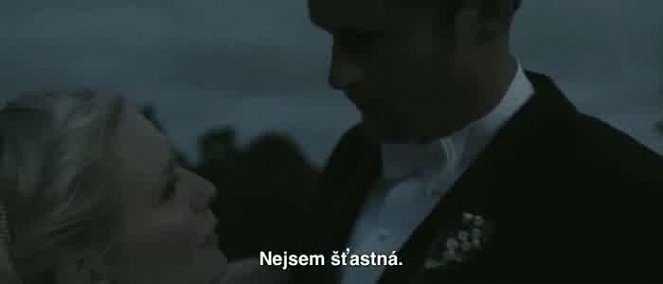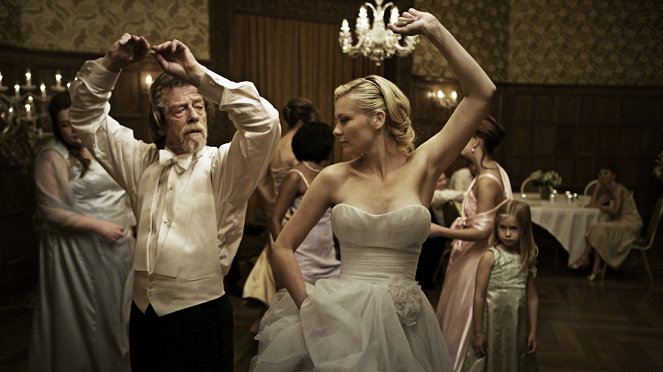Directed by:
Lars von TrierScreenplay:
Lars von TrierCinematography:
Manuel Alberto ClaroCast:
Kirsten Dunst, Charlotte Gainsbourg, Kiefer Sutherland, Charlotte Rampling, Udo Kier, Alexander Skarsgård, Stellan Skarsgård, John Hurt, Jesper Christensen (more)VOD (5)
Plots(1)
Melancholia is Lars Von Trier's first movie since the widely recognised yet supremely controversial Antichrist. The story is focused on Justine (Kirsten Dunst), who has just arrived at her sister Claire's beautiful mansion for what should be the most exciting day of her life... her wedding. However, as the evening approaches Justine's ‘happy day' turns out to be a harsh wake-up call to some of the troubles in her life that desperately need confronting. As Justine battles her demons a new sense of fear is brought into her life when she learns that a planet named Melancholia is rapidly making its way to Earth. With the knowingness of certain death entering the minds of Justine and Claire they struggle to keep their composure and dark secrets are finally brought to light in what proves to be an epic finale. (Artificial Eye)
(more)Videos (2)
Reviews (10)
In a way, what is typical of most of Lars' films (namely the huge emotional tension and very powerful intensity of the whole work), Melancholia lacks. I write "in a way" because Melancholia richly compensates for this deficit with its tight, masterfully evoked atmosphere, which especially in the final half escalates to the highest heights in its melancholy. Formally, Melancholia follows Antichrist (the extremely slowed down shots and the perfect composition of the image in the opening sequence are once again breathtaking – plus Wagner's biting melody gives it all the right drive:)) The thing I probably appreciate the most about the entire film is the fact that I was interested the entire time in seeing how the main characters would turn out, something I can't say about the VAST majority of films with similar themes. So, Lars von Trier is again very original in at least one thing – he chooses a sci-fi movie about the end of the world and uses this "banality" (banality in the sense that this theme has been used countless times in movies and the message of similar movies is usually very similar, if not the same) to depict warped family relationships in a very evocative way, and again he lets the viewer watch the despair and melancholy spill over from one character to another throughout the film. While it didn't feel as "gut-wrenching" at the end as Breaking the Waves, Dancer in the Dark, or Dogville, that didn't change the fact that I couldn't get the film out of my head for a few days).
()
My first meeting with Lars von Trier went very well. After the breathtaking introduction I was sorry I didn't catch Melancholia in the movie theatre. After the first part I was delighted and after the following part I was slightly confused but still extremely satisfied. The combination of handheld "earth" camera, "space" views (of which there are not many), music (Wagner!) and perfect acting performances (with the unbeatable Kiefer Sutherland in the lead) was a success. I probably didn't understand everything, but that's why I'll gladly watch the film again in the future.
()
After comedy, musical and horror, Lars von Trier ruins another genre and I bite it hook, line and sinker. The best film of the first half of 2011 and a purely emotional affair about the end of good things (not necessarily the world), pointless hopes and relationships. What captivated me the most was the evolution of the two main characters. Even though the film can be seen as a poem about the end of the world, there are couple moments that open the door for the most diverse interpretations (the 19th hole, the gangway that can’t be easily crossed, the celestial bodies that behave as if they didn’t know basic school physics). Lars von Trier is number one in the list of my favourite Nazis. That was the review, now a short spoiling interpretation to think about: In the first part of the film they say that John’s golf course has 18 holes, but in the second part we see Claire and her son at the 19th hole. This means that at least one part of the film is not real, or that it is based on reality, but it takes place in a different way than we what we can see. The key is in the conversation in the first part that stresses the fact that the course has 18 holes. That’s nonsense. 18 hole courses are standard, why would the characters explicitly point that out? They would point it out only if John’s course had a non-standard number of holes. We have therefore reason to believe that the events in first part of the film take place in a different way than we what see. We see all of them through the eyes of Justine (after whom the chapter is titled), who, facing the end of the world, transforms the apocalypse into a botched wedding in a world where the planet Melancholia is only a dot in the sky that reminds that whatever happens, things can always get worse (regardless of whether the wedding is a memory or fiction). The world in the first part of the film is a desired world without the 19th hole / without a final and unsolvable problem. So, even though Melancholia left me with a pretty unpleasant feeling right after watching it, after some time what I get is a cynical, though essentially positive message: never mind earthly worries, things will be worse when the universe starts making trouble. But it doesn’t really matter what Lars thought, anyone who willing can find something for themselves, the rest can ignore it. That’s the beauty of post-modernism. PS: Plenty of Visigoths left the cinema, lol.
()
This is one destruction of the planet that I actually want to see as a movie. And it’s just as powerful as I had imagined. The human perspective gives the circumstances a certain authenticity and the limited cast in the second half also makes the atmosphere suitably intimate. At the same time, the first “wedding" part comes across like a sarcastic view of various character faults, but maybe it was simply meant to make us feel better, that nobody is perfect and maybe that everybody gets what he/she deserves. Excellent casting, with a weird, but utterly perfectly unstuck Kirsten Dunst and a perfect Kiefer Sutherland who gives a great performance of the only normal (or at least the only character I could identify with) character and spends his time drawing any attention to himself, but as soon as Melancholia comes along, it sweep them all from the surface of the Earth. Amazing escalation. The earth is evil.
()
Melancholia was my first film of Lars von Trier's and I can already say with certainty that it won't be my last (on my viewing side). At the beginning, it looks like some kind of avant-garde film, with a succession of highly expressive scenes that may or may not be related. Then there's a wedding with all that entails, but it doesn't go as planned, and to make matters worse, the planet Melancholia is moving towards (away from) Earth, as if deciding whether or not to crash into the blue planet. As far as the cinematography, the production design and indeed the overall visuals are concerned, it's a really good show. The performances by Kirsten Dunst (again in a troubled girl role) and Charlotte Gainsbourg are amazing and breathtaking, which, along with the perfect musical score, add to the overall stifling atmosphere. In short, a film that is definitely not for everyone (even I had to keep my distance at times), but I have to say it is worth seeing on the big screen.
()



Ads